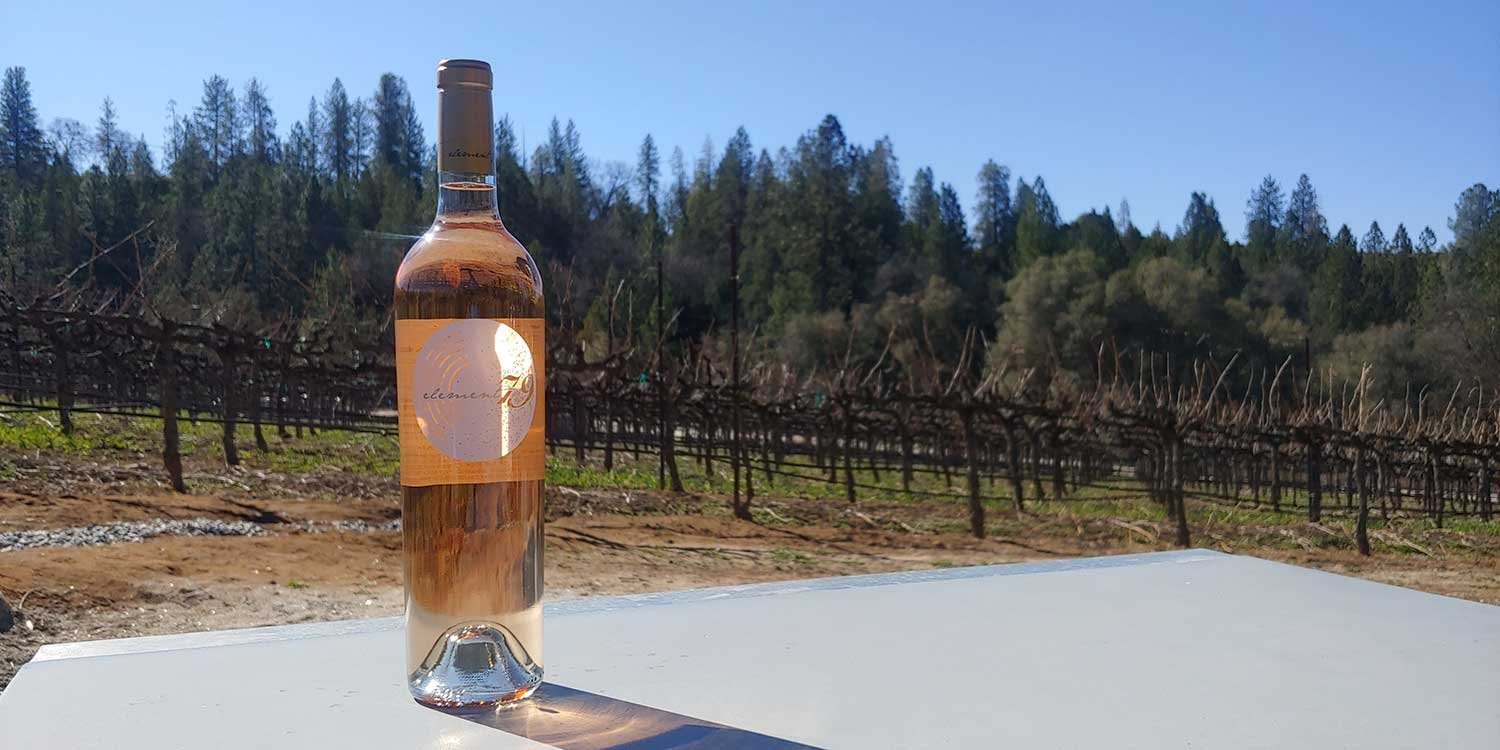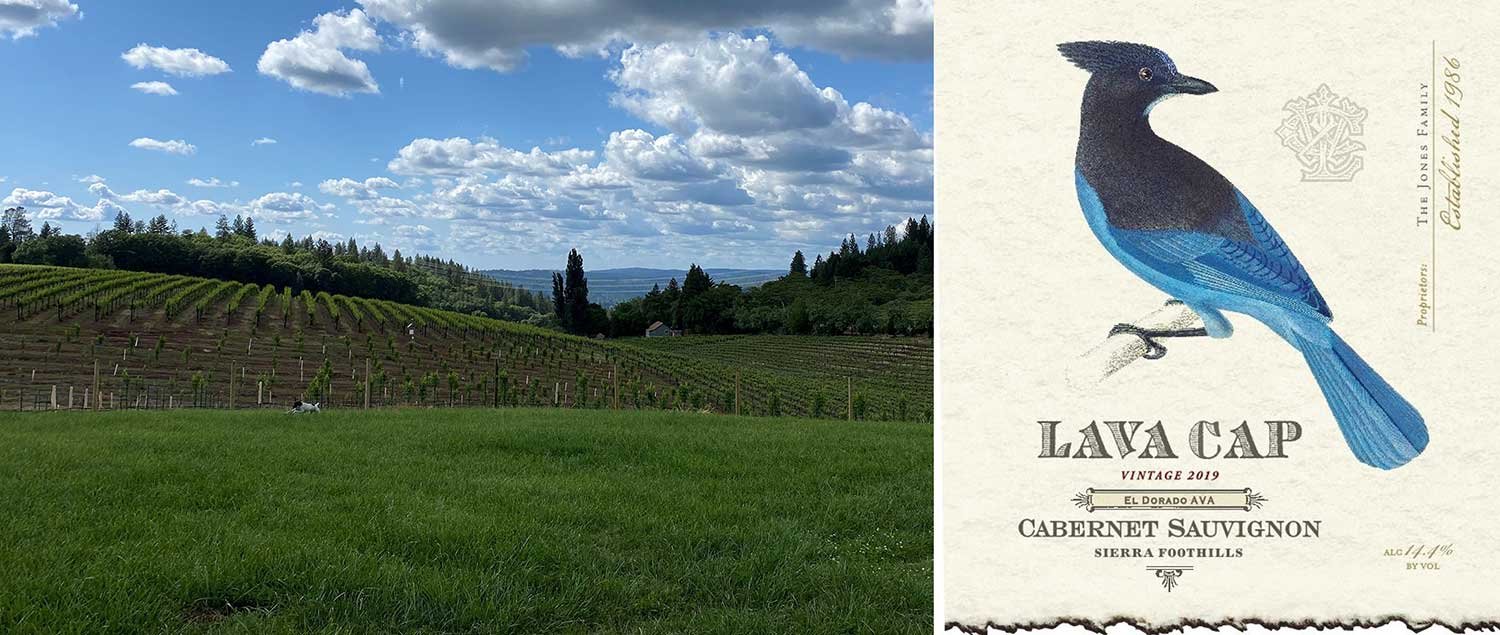By RH Drexel
One of the great pleasures of pursuing wine as a hobby is that there’s always something new to explore. As is the case with most classic art forms – painting, music, photography, theatre, literature – it’s nearly impossible to become an exhaustive expert in any of these fields, and so boredom seldom comes knocking.
Though I’ve been a wine enthusiast for over three decades, I am just now discovering the wines of California’s El Dorado wine country. One hour west of Lake Tahoe, and one hour east of the state’s capital, Sacramento, this alpine region’s highest-elevation vineyard sits at 3,500 feet. It is this elevation that distinguishes the El Dorado AVA from other regions in the greater Sierra Foothills appellation. With mountain vineyards ranging from 1,200 to 3,500 feet elevation, the best wines in the region highlight a bracing, natural acidity – a bright, tart Conifer sensibility, with numerous wines, both white and red, exhibiting a pine-like freshness in the aromatics.
The first vineyards in El Dorado were planted in 1849, just one year after gold was discovered in Coloma, a small town at the edges of this untamed growing region. The region’s 70 wineries enjoy diverse soils offering a variety of geologic and geographic influences that impact the grapes with deeply concentrated flavors. Most of the vineyards in El Dorado are planted in young volcanic, granitic, and slate soils. These soils are thin and lack a permanent water table, the lack of which allows winegrowers to apply appropriate water deficits to limit vegetal growth and encourage the development of smaller berries, higher color concentration, and higher skin-to-juice ratios.
The beating heart of this diverse, decentralized region is the township of Placerville, where visitors to the region typically stay. It’s an off-beat little town, anchored by the 150-year-old, wonderfully and eccentrically stocked Placerville Hardware Store. The rest of the town’s modest, yet long-ish Main Street includes a few dive bars, some antique shops, a small boutique for aspiring Wiccans, live music venues, galleries, an emporium for survivalists, a pretty well-stocked marijuana dispensary and some great bakeries and cafes.
Where to Stay:
El Dorado is best suited to adventurous travelers who don’t necessarily need luxurious accommodations to enjoy their stay, though those are certainly available. Still, it’s a region that seems uniquely attractive to the van life culture, the Airbnb wanderer and the outdoorswoman and man. Though there is an inexpensive Best Western Plus in Placerville ($160.00 a night), the most popular accommodations in this region are its ample and campgrounds. The Madrone Tree Hill Resort is a Christmas tree farm that doubles as a well-maintained campground, with campsite and cabin rentals available. The Camp at Coloma offers guests many options, from luxurious Airstreams with Wi-Fi, on-site dining services and hot showers, to RV hook-ups, well-appointed, pet-friendly cabins and more traditional campsites. Travelers looking for something higher end yet still whimsical need look no further than the Hermosa House Bud and Breakfast. Cannabis and canine friendly, this two-story inn offers a sunny environment rich in art and culture. Guests may enjoy High Tea service at 4:20 p.m., during which cannabis-infused teas are served. There’s also yoga and meditation on offer, as well as a peaceful outdoor garden.
Where to go wine tasting:
Starfield Vineyards
Founded by naturalist, owner and winemaker Tom Sinton, Starfield Vineyards is a stunning way to start an El Dorado wine excursion. Nature lovers will be enchanted by the nearly 67 acres of hillside vineyards, shaded by ponderosa pines and surrounded by groves of azaleas, rhododendrons, hydrangeas, dogwoods, aspen, maples, and scarlet oaks, not to mention the nearly 10,000 flowers and ornamental shrubs found throughout the estate.
Starfield’s beautifully made wines are balanced, light-on-their-feet and equally light on extraction. A stimulating collection of well-made, intentional wines is presented alongside a thoughtful culinary program. Food lovers will want to experience Chef Yutaro’s pairing menu. Formerly the Sous Chef at Santa Monica’s 2-star Michelin restaurant Melisse, and San Francisco’s 3-star Michelin restaurant Benu, Chef Yutaro oversees a decidedly progressive Prix Fixe menu, with modern takes on Salad Lyonnaise and Winter Golabki, which, when paired with the 2019 Starfield Mourvèdre, is a delicious revelation.
Edio Vineyards at Delfino Farms
The Delfino Family has been farming in El Dorado since 1964. Third generation siblings Christine, Peter and Derek Delfino, all graduates of Cal Poly San Luis Obispo, oversee daily operations. Young and charming, the siblings are a talented bunch, with Peter heading up winemaking while Derek handles farming. Christine oversees marketing and hospitality. A well-oiled machine, the Edio team manages a multi-faceted business model, producing an elegant lineup of wines that possess varietal character and great acidity – a hard cider called Henrietta Stitch that is a real keeper, and a bakery on site producing delicious pastries. Their 2019 Edio Estate Grenache appeals to my adoration of this variety’s lighter, more elegantly finessed nature.
Madroña Vineyards
I love Riesling. It’s hard to find a great American one, though. At least that’s been my experience. Fortunately, there are producers like Ravines, in upstate New York, making wonderful Rieslings, but I long for that faint hint of petrol amid so much freshness and aromatic energy idiomatic of German Rieslings. So, I certainly didn’t expect to find world-class Riesling in El Dorado, of all places. But Madroña winemaker and owner Paul Bush is making some of the most refined and exemplary Rieslings I’ve tasted outside of Germany. When I tasted his 2007 Estate Riesling, still a baby, I immediately wished I could pour it blind for contemporary Riesling educator of note, Robert Dentice. This estate is too far under the radar for the level of wines they’re producing, and at varying price points to boot; even the entry-level Riesling, at about $26.00 a bottle, is a great, delicious buy. Bush is also gifted at translating Grenache and Malbec, two of my other favorites from this producer. A place to check out if you’re an adventurous wine geek.
Element 79
Named for the 79th element on the periodic table – gold – Element 79 Vineyards is in the Fair Play sub-appellation of El Dorado. Owners Sharon and Les Heinsen offer an approachable, friendly hospitality experience that includes a few food and wine pairing options. A standout wine from Element 79 is their Abby’s Rose of Syrah, Zinfandel and Viognier. Made by winemaker Scott Johnson, it’s a rose grown and made with intention, and it shows. The Heinsens, both born and raised into farming families in North Dakota, are focused on producing wines that go well with food, as they’re apt to entertain often. I dined with them one night, as friends from around the appellation came and went through their front door with ease and good humor. Most were either established or home winemakers, but, unlike dinner parties in other winemaking regions where shop talk dominates at the dinner table, the Heinsens and their neighbors mostly chatted about music, grandkids, and life in general. Refreshing.
Miraflores
Miraflores was founded in 1998 by Dr. Victor Alvarez, who grew up on his family’s dairy in Columbia, South America. He wisely brought on winemaker Marco Capelli early in the winery’s evolution. Capelli, an uber-talented winemaker from the Napa Valley who studied under the legendary André Tchelistcheff, introduced a range of balanced, elegant wines to the area early on. Since that time, Capelli has mentored the estate’s current winemaker, Fernando Abarca, who grew up in Morelos, Mexico, where he studied at the Zacatepec Institute of Technology. Soft-spoken and intelligent, Abarca is confident when he presents his wines, which include a compelling Estate Syrah, for which Miraflores is perhaps best known. And yet I found myself gravitating towards their after-dinner wines, although I typically steer clear of these types of offerings from domestic wineries. I often find them too cloying and largely uninteresting. However, the non-vintage Angelica, made using the solera method, is truly delicious and balanced – a lovely after-dinner drink to pair with sharp, flavorful hard cheeses, or simply by itself.
Lava Cap
A visit to El Dorado isn’t complete without a tasting at Lava Cap. Charlie Jones opened Lava Cap in 1986, and the family has quietly been producing high-elevation wines of character since then. Sons Emmet and Nolan, a Harvard graduate, have hopped on board to help run the family business. Emmet, a geologist, is the viticulturalist, while Nolan runs marketing and sales. Winemaker Joe Norman, formerly of Heitz Cellars and the creator of some of Heitz’s most legendary offerings from Martha’s Vineyard and Bella Oaks, makes balanced, understated wines that tend to lean towards restraint. The Lava Cap Cabernet Franc is a real beauty – precise, shy at first and ultimately, abundant with nuance and a violet-tinged prettiness. Their 2020 Gamay Noir is fun to drink, the thinking man and woman’s Glou Glou.
Boeger Winery
I will admit that I’ve saved the best for last. I really enjoyed visiting Boeger Winery. It’s got everything – a long lineage, a rich local history, and modern, balanced, delicious wines. Founded in 1972, it was the first post-prohibition winery established in El Dorado. Founder Greg Boeger has always been a bit of an outlier, experimenting with grape varieties like Barbera, Carignane, Refosco, Charbono, and Aglianico before it became fashionable to do so. Son Justin, who is currently the winemaker, is perhaps more gifted than he realizes. Retiring and shy, he presented one wine after another that could be poured with confidence at any wine bar in Manhattan, San Francisco, or Los Angeles. At $25.00 a bottle, the Boeger White Pinot Noir, a still wine, is energetic, taut and drinks like a casual Fevre. That these purposeful, modern wines are found on such a historic site is seemingly contradictory at first. The grounds are old-timey, complete with the original blacksmith shop (dating back to the 1800s) and an equally antiquated gravity-fed winery that today serves as a tasting venue. But once you get the feel for the place and notice the small touches (a cathedral of Redwoods, planted by the Boeger family, that now towers above the main hospitality center) they reflect a family that is forward-thinking in their stewardship of the environment while still protective of the area’s past. First-time visitors to Boeger Winery are wise to set aside a couple of hours to truly enjoy the grounds, history and the wide-ranging and satisfying array of wines offered.
Where to eat:
The Independent, located in Placerville, is contemporary yet cozy, and the cocktails are well-made. This is steak and potatoes country, and the best dishes on the menu include the hand-cut, marbled ribeye, but there are ample choices for pescatarians as well.
Christian and Jennifer Masse, of Valance in the South of France, created Allez!, one of the region’s most popular restaurants among locals. They don’t accept reservations and lines are typically long, but if you’re able to grab a table, do, and enjoy their hearty, delicious, traditional standbys, like Coq au Vin, Boeuf Bourguignon, or Escargot a la Bourguignonne. Reminiscent of Monsieur Marcel's, in Los Angeles’ Fairfax Farmer’s Market, Allez! is a classic French bistro that delivers great food and an understated European charm.
Timmy’s Brown Bag on Placerville’s Main Street is a great take-out joint. Founded by Ukrainian Timothy Swischuk (aka Timmy), Timmy’s sandwiches include a scrumptious Timmy’s Bành Mí, made with Cantonese lap cheong sausage, yellow pickled daikon, jalapeño sweet chili “sauce for chicken” slaw, fresh jalapeño, fresh mint, fresh cilantro, fresh Thai basil, fresh pea shoots, wasabi peas, Chinese barbecue pork floss aioli on a brioche bun. The PYROHY {pierogi, varenyky} and the truffle tots are also must-haves.












